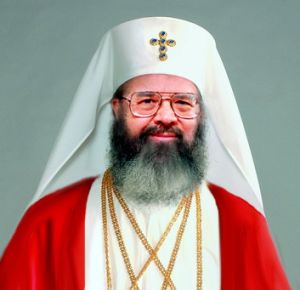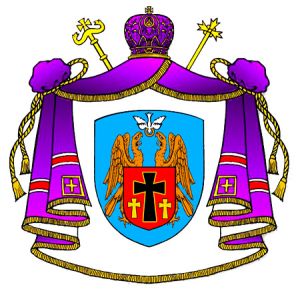Romanian Orthodox Church
| Patriarch | |
| Founding | 1878 |
| Headquarters | Bucureşti |
| Territory | Muntenia, Moldova, Oltenia, Transylvania, Hungary, etc. |
| Adherents | Approximately 18,265,233 |
| Arms |
The Romanian Orthodox Church (Biserica Ortodoxă Română) is an autocephalous Eastern Orthodox Church. Soon after the independence of Muntenia was a achieved in 1877, the aging Alexandru I sought the unification of different Orthodox churches in Romania as part of his effort to create a united Romania. The Metropolitans of various provinces met and petitioned the Patriarch of Constantinople, eventually being granted autocephalous status in 1885. Such status was already part of the Muntenian Constitution.
The Metropolitan was elevated to Patriarch in 1925.
Following the Second Great War, the various states of Romania fell under the sway of the SNOR and hence the Church was viewed as an arm of the state. The Patriarchate and the Muntenian Monarchy were more-or-less allies in trying to retain some independence from Russia, but throughout those years the priesthood was influenced to some degree by the Securitate as well as other security organizations.
During the Regency of Istvan Gheorghiu (1979-87) the Orthodox Church found itself receiving the benefit of that dictator's prejudices, as he seized properties from the Roman Catholic Church and gave some of them to the Orthodox. After the Restoration, legal wrangling about said properties took nearly a decade to conclude. Some hard feelings remain within Oltenia and elsewhere over these events.
The current Patriarch, Bartolomeu (born 1949), was elected in 1997 and has proven to be a diplomat as well as a moderate theologian. However, rumors persist of his supposed ties as a young priest to the Snorist regime especially the rule of Gheorghe Milţeanu. He is expected to (one day) crown young Aurel II as monarch of Moldova. Some controversy exists over his invitation to Rome to witness the marriage of Nicolae Vladescu Vlas-Florea, heir to the throne of Oltenia.
Another problem faced by the Church is a small group of religious dissidents/conspiracy theorists known as Pavelists, who are hostile to the Orthodox Church.

